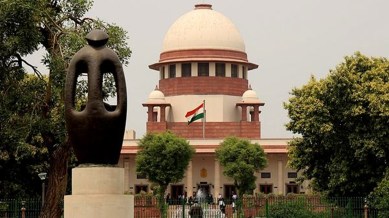Stay updated with the latest - Click here to follow us on Instagram
‘Can’t micromanage from Delhi’: Supreme Court disposes of PIL against mob lynching, cow vigilantism
The Supreme Court bench said its directions in Tehseen S Poonawalla vs Union of India are binding on all authorities in view of Article 141 of the Constitution.

The Supreme Court Tuesday disposed of a pending Public Interest Litigation (PIL) which highlighted alleged instances of mob lynching and cow vigilantism and asked those aggrieved to pursue the remedies available in law.
A bench of Justices B R Gavai and K Vinod Chandran said it had already passed directions in the main matter in Tehseen S Poonawalla vs Union of India in 2018. The court pointed out that the situation would be different in every state and it will not be possible for it to manage everything from Delhi.
monthly limit of free stories.
with an Express account.
The bench said its directions in the Tehseen Poonawalla case are binding on all authorities in view of Article 141 of the Constitution and they are bound to follow it.
The apex court said, “If there is non-compliance with Tehseen Poonawalla, aggrieved person has remedy in law. Sitting in Delhi, we can’t monitor incidents in different areas in different states of the country. Such micromanagement would not be feasible. If any other person is aggrieved, they can approach (concerned authority) in accordance with law.”
The plea also prayed that a uniform minimum amount be paid to the victims as compensation for injuries, etc. On this, the bench said the adequate compensation would differ from case to case. “No uniform direction can be issued to authorities” it said, adding that doing so “would be taking away discretion for determining compensation.”
The court said it finds that a petition “seeking such omnibus reliefs would neither be in the interest of victims.”
The petitioner’s counsel told the bench that various states have issued notifications giving private persons power for cow protection. This was the source of all problems, he said, adding the state machinery acts brazenly when such incidents occur and cases are registered against victims.
Solicitor General Tushar Mehta, appearing for the Centre, said the notifications can be challenged before high courts.
The bench also said it cannot decide the validity of the various state enactments in one go and that it will be appropriate for the aggrieved to approach the jurisdictional high court to challenge the constitutional validity of the notifications.